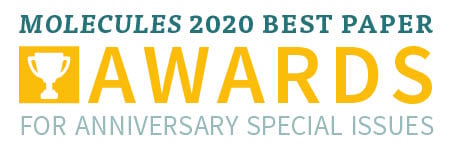25th Anniversary of Molecules—Recent Advances in Molecular Liquids
A special issue of Molecules (ISSN 1420-3049). This special issue belongs to the section "Molecular Liquids".
Deadline for manuscript submissions: closed (31 December 2020) | Viewed by 3073
Special Issue Editors
Interests: ionic liquids; green chemistry; computational chemistry; reaction mechanisms; physical organic chemistry
Special Issues, Collections and Topics in MDPI journals
Special Issue Information
Dear Colleagues,
In 2020 we are celebrating the 25th anniversary of our journal Molecules.
In the same timeframe, the field of molecular liquids has had a remarkable evolution. Whole new classes of molecular liquids have made their appearance on the field: ionic liquids and, more recently, deep eutectic solvents (DESs). These two classes of molecular liquids are related, as their use as solvents is strictly related to a great theme of current chemistry: sustainability. This has led to a redefinition of the role of solvents: not only a reaction medium, but also something that must be recycled and reused. Some old-fashioned solvents like water have been revamped by this new requirement.
In the meantime, the development of models and theories describing the nature of molecular liquids has been notable. Presently, molecular dynamics methods, continuum solvent models, and other computational approaches are routine tools to predict the properties of molecular liquids and to describe their effect on chemical reactions.
In this Special Issue, we will try to present a set of papers that describe one or more of the above-mentioned themes.
Prof. Dr. Christian Silvio Pomelli
Dr. Andrea Mezzetta
Guest Editors
Manuscript Submission Information
Manuscripts should be submitted online at www.mdpi.com by registering and logging in to this website. Once you are registered, click here to go to the submission form. Manuscripts can be submitted until the deadline. All submissions that pass pre-check are peer-reviewed. Accepted papers will be published continuously in the journal (as soon as accepted) and will be listed together on the special issue website. Research articles, review articles as well as short communications are invited. For planned papers, a title and short abstract (about 100 words) can be sent to the Editorial Office for announcement on this website.
Submitted manuscripts should not have been published previously, nor be under consideration for publication elsewhere (except conference proceedings papers). All manuscripts are thoroughly refereed through a single-blind peer-review process. A guide for authors and other relevant information for submission of manuscripts is available on the Instructions for Authors page. Molecules is an international peer-reviewed open access semimonthly journal published by MDPI.
Please visit the Instructions for Authors page before submitting a manuscript. The Article Processing Charge (APC) for publication in this open access journal is 2700 CHF (Swiss Francs). Submitted papers should be well formatted and use good English. Authors may use MDPI's English editing service prior to publication or during author revisions.
Keywords
- Molecular liquids
- Green Solvents
- Ionic liquids (ILs)
- Deep eutectic solvents (DESs)
- Molecular Dynamics
- Solvent effect
- Continuum models of solvents
- Solvatochromism
- Thermal analysis
- Solvents and catalysis
- Electrochemistry and electronic applications
- Extractions
- Biomass treatments
- Physical characterizations








